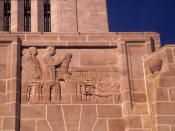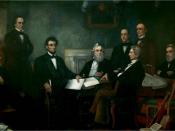Free America Honors History What caused America to become a free un-racist country to live in? The blacks were always treated unfairly and just completely unreasonable. A man named Abraham Lincoln helped free these blacks, and the Emancipation Proclamation was a start in doing so. What led to the signing of the Emancipation Proclamation, and what were the causes of it.
The black people first came to America to be slaves of the white men.
They were treated with total disrespect. Most of the slaves were placed in auctions in the southern states where slaves were heavily populated. The blacks were not allowed to do anything while in America. They were totally controlled by their leaders, the white men. They were not allowed to ride on the same buses, go to schools, or even drink from the same water fountains.
This is just a few of many things the blacks were not allowed to do.
The only thing they were allowed to do were work for the white man for a price of nothing, maybe a few pieces of bread or so once in awhile. They were beaten and whipped for the hell of it, and they could do nothing in return because they would receive the death penalty. The women were raped and slaughtered, and nothing was even thought of it. It was just a normal thing that went on. And this is America, the free country. Something had to be done about this, but no one had the guts to do about it. All they cared about was they were getting all there dirty work done while sitting inside. The battle of Antietam was "the bloodiest battle of all time"ÃÂ. It took place on September 17, 1862. It was the climax of General Robert E. Lee's attempt to take the war northward. General Lee only had 40,000, but his men were experienced and confident in their fighting ability. Lee's opponent: General George B. McClellan had an army of 87,000, but they didn't have nearly as much experience as Lee's army. Lee had fought his way all the way up to Antietam creek while McClellan followed. On September 15th both armies had their battlelines on each side on antietam creek, and on the 16th they had both stationed their men. On the 17th at dawn the war started.
The war lasted only a few days, but it was Lee's lack of men and the exhaustion of his men that caused Lee's defeat. Lee's defeat caused Great Britain to postpone recognition of the confederate government making the confederate states weak. This allowed president Abraham Lincoln to issue the Emancipation Proclamation. Antietam had the most casualties in one day than in any other battle that occurred during the civil war. Federal losses were 12,410, and the confederate losses were 10,700, and remember all these casualties happened on the 17th of September. This war changed the dual purpose of the was, now the purpose was to preserve the Union and end slavery.
The civil war started for many reason, but ended for different reason.
It started because the North and the Sounth had different views. The south ended up separating thier 11 states from the north in order to have their government. The North's reasons for fighting this war were simple. All they wanted to do was to preserve the Union. They wanted to have roads, more land, and railroads. The South wanted none of these things. They wanted to win the recognition as an independent nation. With all the tension between the North and the South it was definite that this was was going to break out.
After the battle of Antietam President Abraham Lincoln decided to sign the heavily awaited Emancipation Proclamation. It reads as follows: Whereas on the 22nd day of September, A.D. 1862, a proclamation was issued by the President of the United States, containing, among other things, the following, to wit: "That on the 1st day of January, A.D. 1863, all persons held as slaves within any State or designated part of a State the people whereof shall then be in rebellion against the United States shall be then, thenceforward, and forever free; and the executive government of the United States, including the military and naval authority thereof, will recognize and maintain the freedom of such persons and will do no act or acts to repress such persons, or any of them, in any efforts they may make for their actual freedom.
"That the executive will on the 1st day of January aforesaid, by proclamation, designate the States and parts of States, if any, in which the people thereof, respectively, shall then be in rebellion against the United States; and the fact that any State or the people thereof shall on that day be in good faith represented in the Congress of the United States by members chosen thereto at elections wherein a majority of the qualified voters of such States shall have participated shall, in the absence of strong countervailing testimony, be deemed conclusive evidence that such State and the people thereof are not then in rebellion against the United States." Now, therefore, I, Abraham Lincoln, President of the United States, by virtue of the power in me vested as Commander-In-Chief of the Army and Navy of the United States in time of actual armed rebellion against the authority and government of the United States, and as a fit and necessary war measure for suppressing said rebellion, do, on this 1st day of January, A.D. 1863, and in accordance with my purpose so to do, publicly proclaimed for the full period of one hundred days from the first day above mentioned, order and designate as the States and parts of States wherein the people thereof, respectively, are this day in rebellion against the United States the following, to wit: Arkansas, Texas, Louisiana (except the parishes of St. Bernard, Palquemines, Jefferson, St. John, St. Charles, St. James, Ascension, Assumption, Terrebone, Lafourche, St. Mary, St. Martin, and Orleans, including the city of New Orleans), Mississippi, Alabama, Florida, Georgia, South Carolina, North Carolina, and Virginia (except the forty-eight counties designated as West Virginia, and also the counties of Berkeley, Accomac, Northhampton, Elizabeth City, York, Princess Anne, and Norfolk, including the cities of Norfolk and Portsmouth), and which excepted parts are for the present left precisely as if this proclamation were not issued.
And by virtue of the power and for the purpose aforesaid, I do order and declare that all persons held as slaves within said designated States and parts of States are, and henceforward shall be, free; and that the Executive Government of the United States, including the military and naval authorities thereof, will recognize and maintain the freedom of said persons.
And I hereby enjoin upon the people so declared to be free to abstain from all violence, unless in necessary self-defense; and I recommend to them that, in all case when allowed, they labor faithfully for reasonable wages.
And I further declare and make known that such persons of suitable condition will be received into the armed service of the United States to garrison forts, positions, stations, and other places, and to man vessels of all sorts in said service.
And upon this act, sincerely believed to be an act of justice, warranted by the Constitution upon military necessity, I invoke the considerate judgment of mankind and the gracious favor of Almighty God."ÃÂ The Emancipation Proclamation did not set many slaves free, but it did do a lot. It only set the slaves free that lived in the North. It spread the word round the nation on how slavery is bad. After Lincoln signed this after the battle of Antietam the reason for fighting had shifted. Now it was to end slavery. The North's victory at Antietam caused Lincoln to sign this document. The North needed a win badly, and lincoln needed it to be able to sign the the Emancipation Proclamation. Antietam weakened the South's government. After the war the South had no way out, but to follow the United States Constitution.


